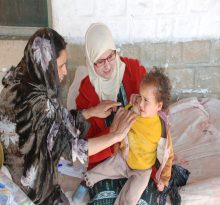Center
Functions of the Center for Disease Control.

- The Center for Disease Control shall set the strategic agenda and mandate related to infectious disease surveillance as well as promotive, preventive and therapeutic aspects for infectious diseases of public health importance in Pakistan
- The Center shall perform such functions as are directed and assigned by the Federal Government or the Board including,-
- Advisory on epidemics, disease outbreaks, prevention, control, surveillance and response to an outbreak;
- Preparation and application of the principles and techniques of emergency and preparedness at the national and sub-national levels;
- Develop an Emerging Infections Unit, the functions of which shall include-
- Surveillance and monitoring of emerging infections and conditions of public health importance via scientific and modern methods and technologies;
- Analysis and interpretation of surveillance data and information;
- Formulation of emergency response to prevent, control and manage emerging infections;
- Formulation of disease prevention programs which shall institute population-based and individual based prevention interventions that aim to minimize the impact of emergency on the loss of life and property, and to reduce the risks associated with the disease;
- Drug and vaccine stockpiles;
- Health promotion and health security;
- Communication and coordination with international, national and sub-national organizations for development of strategies of disease control; and
- Dissemination of information and communication with the public for implementing controls and mitigation strategies.
- Develop a Diseases Specific Unit, the functions of which shall
- Management of ongoing special disease programs such as Polio, HIV, Hepatitis, Tuberculosis, Malaria etc.;
- Management of future emerging special disease programs as identified by experts such as carbapenem resistant Enterobacteriaceae, drug-resistant typhoid, COVID-19 etc.;
- Access, examine and incorporate emerging international developments in public health laboratory and drugs sciences;
- Preventive activities contained in a program may include vaccination and post-exposure prophylaxis, provision of information on behavioral and health risks, counselling, nutritional and food supplementation; hygiene and health services; and screening programmes for early detection of disease.
- The Center shall with the assistance of the Federal and Provincial Governments and all public authorities develop and maintain a surveillance system to monitor infections and conditions of public health importance.
- The Center shall develop a testing and quarantine policy for the augmenting of the contact tracing efforts of exposed or infected individuals, which shall be implemented in collaboration with the Federal and Provincial Health Departments and other the health authorities in Pakistan who shall all ensure assistance to the Center in implementation of the provisions of this Ordinance.
- The Center in implementing its functions and the provisions of this Ordinance shall ensure the highest standards of human respect, dignity and privacy and shall ensure maintenance of secrecy of personal health information and data of the citizens in a manner that the same is not disclosed to any person so as to cause any damage to the respect, dignity and reputation of a the citizens.







